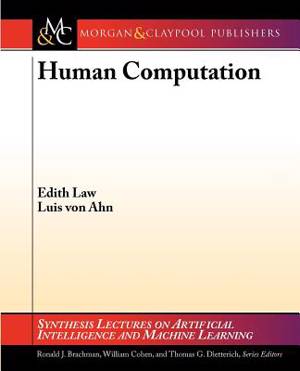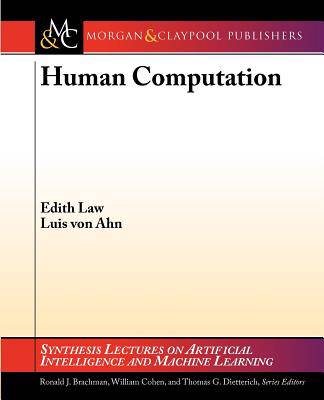
- Afhalen na 1 uur in een winkel met voorraad
- Gratis thuislevering in België vanaf € 30
- Ruim aanbod met 7 miljoen producten
- Afhalen na 1 uur in een winkel met voorraad
- Gratis thuislevering in België vanaf € 30
- Ruim aanbod met 7 miljoen producten
Zoeken
Omschrijving
Human computation is a new and evolving research area that centers around harnessing human intelligence to solve computational problems that are beyond the scope of existing Artificial Intelligence (AI) algorithms. With the growth of the Web, human computation systems can now leverage the abilities of an unprecedented number of people via the Web to perform complex computation. There are various genres of human computation applications that exist today. Games with a purpose (e.g., the ESP Game) specifically target online gamers who generate useful data (e.g., image tags) while playing an enjoyable game. Crowdsourcing marketplaces (e.g., Amazon Mechanical Turk) are human computation systems that coordinate workers to perform tasks in exchange for monetary rewards. In identity verification tasks, users perform computation in order to gain access to some online content; an example is reCAPTCHA, which leverages millions of users who solve CAPTCHAs every day to correct words in books that optical character recognition (OCR) programs fail to recognize with certainty. This book is aimed at achieving four goals: (1) defining human computation as a research area; (2) providing a comprehensive review of existing work; (3) drawing connections to a wide variety of disciplines, including AI, Machine Learning, HCI, Mechanism/Market Design and Psychology, and capturing their unique perspectives on the core research questions in human computation; and (4) suggesting promising research directions for the future. Table of Contents: Introduction / Human Computation Algorithms / Aggregating Outputs / Task Routing / Understanding Workers and Requesters / The Art of Asking Questions / The Future of Human Computation
Specificaties
Betrokkenen
- Auteur(s):
- Uitgeverij:
Inhoud
- Aantal bladzijden:
- 122
- Taal:
- Engels
- Reeks:
Eigenschappen
- Productcode (EAN):
- 9781608455164
- Verschijningsdatum:
- 8/07/2011
- Uitvoering:
- Paperback
- Formaat:
- Trade paperback (VS)
- Afmetingen:
- 190 mm x 235 mm
- Gewicht:
- 222 g

Alleen bij Standaard Boekhandel
+ 93 punten op je klantenkaart van Standaard Boekhandel
Beoordelingen
We publiceren alleen reviews die voldoen aan de voorwaarden voor reviews. Bekijk onze voorwaarden voor reviews.











